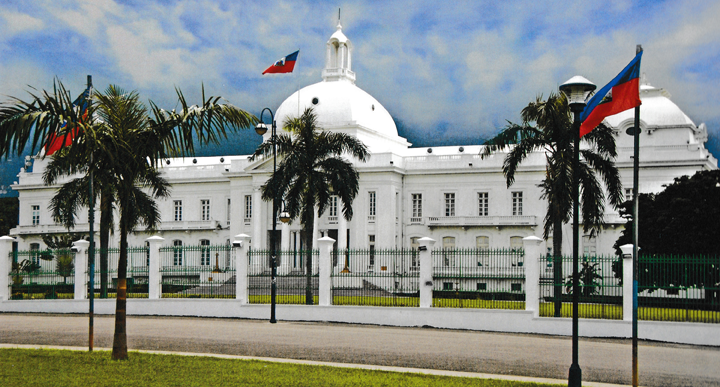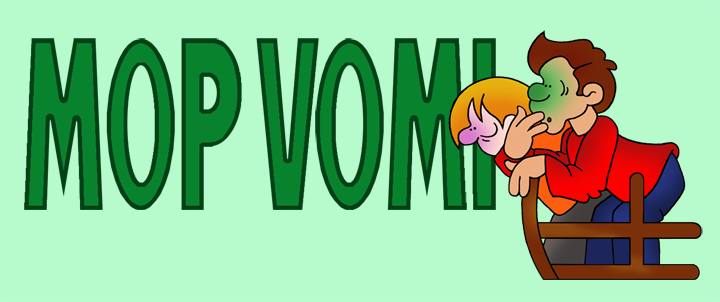I've been to Haiti three times. The first visit was the summer after I graduated from college. My high school French was recent enough in my memory that I learned how to communicate in Haitian Creole by the end of the summer. Don't get me wrong; I was far from fluent. But, I could still communicate with my Haitian friends enough to impress the socks off of my American hosts.
That summer was a long time ago. I can no longer communicate in Haitian Creole. But, I do remember one sentence. I try it out every time I meet someone from Haiti. They always understand me and, at the same time, it usually shocks them. My one sentence is, "Si mwa garday ou, mop vomi." Before I give you the translation, you may or may not know that generally, the first words someone learns in another language are the swear words. I was surrounded by missionaries and church folk on this trip. I wasn't going to learn anything too colorful. Nope, I just learned how to insult someone. So, my one little tidbit in Creole is, "If I look at you, I'll vomit."
Yes, I've used that sentence so many times over the years.
I made my second trip to Haiti about ten years after the first visit. And, on that trip, I had an experience that seriously could have made me "vomi". Other bodily secretions also could have leaked or squirted as well. (I'm talking about tears. What are you thinking?) Anyway, it's a long story. And, after all of these years, it's still one of my best (or worst) travel adventures.
Once Upon a Time in Haiti I thought I was a hardened tourist. I'd done quite a bit of traveling and thought there were no more major surprises in my world travels. I never imagined what would be in store for me when I stepped off the airplane at Port-au-Prince that sunny morning. My intentions were the best. I'd come to Haiti as part of a construction team from my church to build a home for a pastor in Haiti. There was no hurry to get through the line at Immigration. I was the last one in the line and could see some of my friends waiting for me as I handed my passport to the Immigration officer. She smiled and went through the ritual of checking my papers. It took a little longer than expected but I wasn't concerned. I had traveled enough to know that delays were to be expected. The officer excused herself and went to get her superior. Now that concerned me. As I was escorted back to the inner rooms of customs, I had this fear that maybe that list I saw my name on was something other than a list of incoming tourists. But I had no clue what was happening to me.
The Waiting Game Clocks really tick slowly when life is out of your control and all you can do is wait. I sat, trying to be very patient and polite, for an hour in a small back office of customs. Not speaking their language made it difficult to find out what the problem was concerning me. My imagination worked overtime. It was no comfort at all when the superior kept saying, "No problem. No problem." That's what they always say, but if there were "no problem," why was I in the middle of this problem?
Fortunately, the room I was put in had a glass door. My group leader, Charles, eventually located me. He had lived in Haiti before, spoke the language, and knew how to operate in the country. Charles was determined to see what the problem was and how I could be helped. After talking with the superior, he informed me that my name was in fact on a list -- a list of wanted criminals in the country. They thought it was a case of two people with the same name. It was just a matter of paper work to clear up. She said again, "No problem," and I thought, "What a problem!"
 The Postcard View of the former Presidential Palace, blocking the view of the prison behind it.
The Postcard View of the former Presidential Palace, blocking the view of the prison behind it. As we approached the prison, guards unlocked an iron gate, we drove through the entrance, and the gate was locked behind us. We approached a second gate and again the door was locked behind us. This was done three times! I was in the very heart of the prison and tried desperately to remember how the guy in MIDNIGHT EXPRESS escaped from a Turkish prison. I didn't see any way to escape so many guards with so many guns. I wished I had read the book more carefully!
Waiting with Mice, Guns, and Soldiers I was escorted into a small dark waiting room and motioned to sit on a wooden bench. There was a guard in the room at the desk and another outside the room with a machine gun. I wasn't going anywhere. I sat and I sat. I sat until I just had to get up and stretch. The guard quickly growled something that I knew had to mean, "Sit down!" He wasn't to be irritated. I'd already seen him slam a lady to the wall and tell her to stand there with her nose to it. I wasn't going to bother him. I quickly sat down and for the next few hours watched the mice crawl around the room. I knew if there were mice in this waiting room, there had to be rats in the prison cells. It frightened me as the shadows crossed the wall and the sun went down. I had no idea in the world where I'd be spending the night.
I knew my friends knew I was lost but would I really ever be found? Eventually, two men with guns came after me. I was escorted into the office of Colonel Pierre, the head of the prison. How was I going to be interrogated? I didn't speak much French and he barely spoke English. Still, he managed to question me. "Who are you? Where are you from? Why are you here in Haiti? How long will you be here? Where will you stay? Is there anyone here to vouch for you?" Finally, I blurted out in my combination of French and Spanish, "You left my friend Charles at the airport. He speaks your language and can answer all your questions. Why don't you call him?" It was as if a light suddenly turned on. They thought that was a good idea. Colonel Pierre called the airport immediately. He then informed me that he had personally talked to Charles and sent a car to get him.
It was a lie.
Charles to the Rescue! Hours earlier, as I was being shuffled from the airport, a Haitian pastor who came to greet our group saw my unusual departure. On a hunch, he thought I might be the person my group was waiting for. He ran to Charles to describe me. Time for a panic attack. After he recovered, Charles contacted the U.S. Consulate. As my interrogation continued in languages I couldn't speak, there was a knock at the door and in walked Charles with a man from the Embassy.
How did I spell relief? C.H.A.R.L.E.S. Charles was a fast-talking storyteller and quickly started in on my defense. Even in my limited knowledge of the language, I could understand an elaborate "snow job" when one was told. He informed Colonel Pierre that I'd been to Haiti before and had to return because I loved the country and the people so much. So far so good. He continued explaining that I personally had donated $5,000 for our building project in Haiti and if I had given that kind of money, they shouldn't be treating me like this. That was stretching the truth more than a little but I wasn't going to argue the point. At the time it sounded really good to me.
Finally, after six very long hours, a snow job, and the help of the U.S. Consulate, I was released. I kinda wanted to leave the country, but Charles said if I tried that, I would have been arrested again. Customs and the police would have been sure they had the right person after all. I was there for three weeks. I managed to do quite well and avoid the police any more . . . until the bus wreck.
When I eventually landed safely back on home soil in the USA, I actually told my mother about this experience. (I quickly learned that some stories are better left untold.) However, I am glad that I told my mom this story. She found an article in the oh, so reliable, National Enquirer about a man that they compared to Nazi war criminals. And, you already know it was my old friend Colonel Pierre. Yep, in that very prison where I so easily could have disappeared, they tortured and killed people in the basement. I learned that the colonel's favorite method of torture was gouging people's eyes out with his thumbs.
I'm so glad I knew none of that when I sat in his office.
Muraling in Haiti You might have guessed that after this experience, I put Haiti on my list of countries never to visit again. You would be right. And, I held to that decision for a couple of decades. But, when I was invited to paint a mural at a children's hospital, I knew it was time to return.
Of course, my biggest fear was entering the country at the Immigration desk upon arrival in Port-au-Prince. Would there be blood, sweat, tears, or vomi with another arrest? Nobody knew the answer until my passport was stamped and a smiling Immigration agent welcomed me to Haiti -- in English!
After all those years, my story was still enough to shock any Haitian adult old enough to remember the days of the dictator Baby Doc. I don't suppose many people ever left that prison. But now, that dictator is long gone. The presidential palace that hid that prison was destroyed in an earthquake. All that remains are the memories and stories. And, yes, mine is a whopper.
The Memories Continue It so happens that I met a Haitian here in Columbus, Ohio. After I tried out my one sentence in Creole (which, of course, Gardee understood), I said I have a story for you. I told him about my experience with Colonel Pierre. Of course, he was horrified that I had that kind of experience in his country. If I ever go back, Gardee has friends to connect me with for a much better time in his country. I have his phone number just in case . . .
Then, I had one more surprise addition to my prison tale. Gardee said that he knew all about Colonel Pierre. (I've never met anyone who ever said that.) When the dictator was ousted, he told me that Colonel Pierre fled to the United States and he moved to New York! Gardee said he could still point the house out to me where he lived! Now, according to that reliable Enquirer, the colonel got exactly what he deserved in the end. I certainly hope that is the case. If I ever saw Colonel Pierre walking down the streets of New York City, I'm sure I'd have to mop some vomi or something else just as smelly!


 RSS Feed
RSS Feed